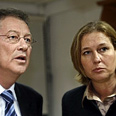
UN envoy warns of renewed Gaza violence
Robert Serry tells Security Council durable ceasefire can only be achieved if there is a prisoner exchange for Shalit, action to prevent smuggling of weapons into Gaza, opening of borders and unity among rival Palestinian factions
The UN's top Mideast envoy warned Wednesday that Gaza could erupt in renewed and more devastating violence unless there is a lasting ceasefire.
Since unilateral ceasefires were declared by Israel and Hamas a month ago, Robert Serry said "Palestinian militants in Gaza have fired 15 rockets and 12 mortars toward Israel and detonated an Israeli jeep near the border fence - attacks that are as irresponsible as they are unacceptable - while Israel has launched 19 airstrikes in Gaza."
"There is an urgent need for all acts of violence to cease and for full respect of international humanitarian law by all parties," he said.
Serry spoke to the UN Security Council shortly before Israel announced that it will not open Gaza's blockaded borders until Hamas militants free captured Israel Defense Forces soldier Gilad Shalit.
The decision was a major blow to Egyptian efforts to broker a long-term ceasefire between the two enemies, and was immediately condemned by Hamas, which desperately wants the blockade lifted so it can start repairing the widespread damage from Israel's military offensive in Gaza last month.
Serry told council members that a durable ceasefire can only be achieved if there is broad progress including an exchange of Palestinian prisoners for Shalit, who was captured in a 2006 cross-border raid, action to prevent the smuggling of weapons into Gaza, the opening of borders, and unity among rival Palestinian factions.
These steps, he said, would also pave the way for the longer term recovery and reconstruction of Gaza.
"I emphasize these points...because one month since unilateral ceasefires were declared, a proper ceasefire is still not in place, and there is an ever present danger of a return to the unsustainable conditions of last year, or even for renewed and more devastating violence," Serry warned.
Asked afterward about Israel's decision to link the border openings with
Shalit's release, the UN's special coordinator for the Middle East peace process said, "If you want to improve the situation in Gaza, you have to look at the other issues as well, and Shalit is a very important one."
'Very grave situation'
The Palestinian UN observer, Riyad Mansour, stressed the importance of achieving a long-lasting ceasefire so that Israel does not go and attack our people as they want but said Shalit's release should not be linked to the opening of border crossings.
"These are two separate issues," he told reporters. "To connect them in this manner, it means that the Israeli government is not interested in a long-lasting ceasefire now, and not interested in opening the crossings and lifting the siege."
Japan's UN Ambassador Yukio Takasu, the current Security Council president, said members noted the fragility of the unilateral ceasefires and also want a durable ceasefire as soon as possible.
Israel launched the 22-day air and ground war on Dec. 27 in an effort to halt years of militant rocket fire by Hamas on its southern communities and arms smuggling into Gaza. The offensive caused an estimated $2 billion in damage and killed nearly 1,300 Palestinians, including hundreds of civilians, Palestinian officials have said, while at least 13 Israelis died.
In the month since major fighting stopped, Serry said, a daily average of 146 trucks loaded mainly with food and medical supplies entered Gaza, four times the number in December but only a third of the number that entered Gaza in May 2007, before the Hamas takeover. There are still food shortages, he said.
Israel has continued to ban gasoline and diesel oil, and only 52 percent of the industrial fuel and 23 percent of the cooking gas required were allowed in during the last month, he said. A 13-month ban on exports continues with the exception of one truckload of flowers bound for Europe.
The UN Development Program estimates that the Israeli offensive damaged and destroyed 14,000 homes, as well as public buildings, schools, and entire industrial areas, leaving destruction in some places that is shocking to see, Serry said.
Palestinian Prime Minister Salam Fayyad, who leads the rival Fatah-run government in the West Bank, announced a plan Wednesday that would stream reconstruction money directly to the people of Gaza. That would effectively sideline Hamas.
Serry told the Security Council that the UN welcomes Fayyad's initiative to provide immediate assistance to the civilian population in Gaza, with U.N. assistance, which will be presented to a donors' conference on March 2 in Sharm el-Sheik, Egypt.
It includes $50 million in cash transfers for temporary shelter, $11 million for electricity repairs, $6 million for water pipeline repairs and a $600 million housing loan guarantee scheme to supplement cash assistance, Serry said.
"We are still in a very grave situation in the region, but also not without opportunities, but for that we need redoubled efforts, and we need particularly also unity in the international community to achieve...progress," he said.
Serry said the UN is also hoping that an important international conference will take place in Moscow before the end of June to relaunch the Mideast peace process.










